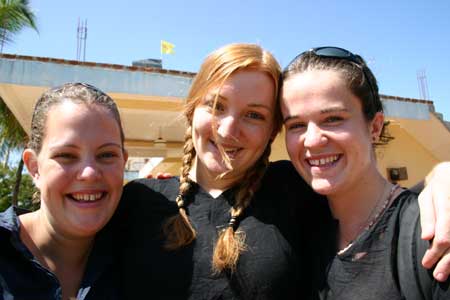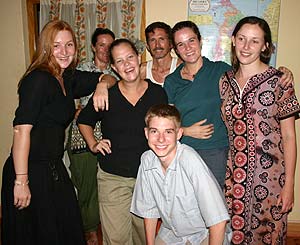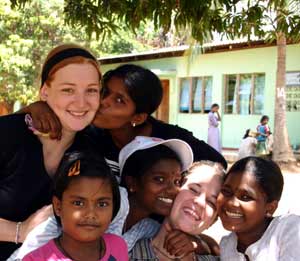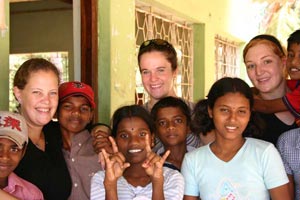
|
||||||||||||
|
| ||||||||||||
Clare McGeever's Story
We touched down in Colombo in the small hours of the morning, when we got off the plane to retrieve our luggage it felt as though the whole of Sri Lanka had come to meet us, everyone wanted to talk to us, answer our questions and help us in any way that they could. If I am honest, we were initially very suspicious of these perfect strangers, why on earth would they want to help us and more importantly what did they want in return? However it seemed our time and conversation was simply enough. Before we really knew what happened and with the help of a lot of lovely people we had exchanged our money, had our bags packed in a taxi and were sent off into the night to our destination. We were to be staying with Sam, an elderly chap who is a friend of The Living Heritage Trust. Sam kindly played host to us for our first 48 hours of Sri Lankan life, he taught us how to eat the Sri Lankan way, how to bath in a well (without his help I am sure one of us would of tried to climb in it!) and most importantly, how to negotiate Colombo! Our primary aim was to get to Batticaloa to meet The Living Heritage Team, so we ventured into the city to buy our train tickets. I have never been culture shocked before, and I consider myself well travelled. However that all changed when we arrived in the big city, to describe it as chaos would be an understatement! Nothing seems to make much sense in Colombo, we had various errands to run and we frequently found ourselves in narrow streets, filled with crazy drivers, and other such obstacles such as cows, donkeys, dogs and very unpredictable pedestrians not really knowing why and how we got there! Again we encountered so many friendly people, it seemed that everybody wanted to chat to us, so we told them about our intentions to work in Batticaloa and of course the hot topic of conversation was the Tsunami. As over 35,000 people died by the Tsunami many people we spoke to had lost relatives or friends.
The train trip from Colombo to Batticaloa takes ten hours. I was excited by the prospect of making the journey, not because it was a chance to escape Colombo, although if I am honest that was an appealing thought, nor because it was a chance to see more of the Sri Lankan country side as it was night train but because it was a chance to experience a subcontinent train journey that I had read so much about in novels and seen in dozens of films. I was certainly not disappointed. The platform in Colombo was full of chaos, drama heat and dust. Food sellers were running up and down the platforms and as the three female foreigners we were attracting a lot of attention. One thing is for sure; we were not in Kings Cross. The train journey was dominated by discussions of our fear about arriving in Batticaloa and of course we suffered frequent interruptions of "where are you from?" or "What is your name?" By then our fears should have really eased up as we really should of realized that no stranger is a stranger for long when you are in Sri Lanka! Our fears consisted of a second tsunami that we had heard much talk of since arriving on the island and of course the main fear that was most prominent in our minds was that of the years of the recent political warfare that had dominated life on the east coast of Sri Lanka. We knew that we would be living in a Tamil area and the word Tamil to an average daily news paper reader is that of violence and war, not exactly a welcoming image! When we did eventually arrive in the small hours of the morning we were greeted so warmly by our soon to be friends at The Living Heritage Trust. One of my most poignant memories of our arrival involved us all sitting on the outside porch of our head quarters watching the sunrise over the ocean which slowly revealed the full scale of the destruction left behind from the Boxing day tsunami. On 26th December 2004 I remember being glued to the television watching as the horrific events unfolded, I thought in some small way this would prepare me for the devastation I encountered on that day. I soon began to understand how a television screen acts as a distancing device to such atrocities. In some small way, when the television is switched off you could pretend that such terrible events don't really exist. That day I learnt that they really do. Seeing and touching the damage and being in such close proximity was utterly devastating and a very emotional experience. For the first time in my life I felt really vulnerable. Through out my time in Batticaloa I took that walk many times and my feeling didn't alter, each walk was full of the same feelings of vulnerability and sadness. What could I, a simple student from England do to possibly do to help this massive human catastrophe? The first few days in Batticaloa are now a hazy blur, I recall speaking to a lady who had lost all four of her children in the Tsunami and another younger girl who had lost all the female members of her family. After that the stories I heard tended to follow a similar pattern. I simply could not calculate how these people could start again. Our first few days in Colombo one of my travel companions Jennie was so culture shocked that she could not speak for the first few days of our arrival in the city, when we arrived in Batticaloa and saw the destruction none of us could really speak. However after a small period of orientation we got into work.
We went off to several children homes run by a local Catholic priest called Father Paul. Our primary job was assess the needs of each home and to write reports. All of the homes we assessed were in need; some needed better sanitation while others needed a clean water supply or better space. We spent our days playing with the children, teaching English and forming friendships. With the girls we played, danced and chatted and with the boys we played (or at least we tried to play) cricket. We played cricket morning, noon and night, and would you believe that I still don't really understand the game! I recall one particular occasion when the ball rolled into a nearby field, I dashed off to retrieve it when one little lad came rushing next to me and said ‘mine'. So I backed off and was prepared to let me dash of and get his ball. I soon realized that he was warning me of the possible dangers of mines in the neighbouring field! During the day while the children were at school we took ourselves off to the market and bought fresh fruit and vegetables for the children to eat on their return from school. We made many friends at the market, and everyday we would stop to have a chat with the man who sold us vegetables or the banana man, in fact we became such good friends with one of our grocery sellers we frequently visited their family home for evening meals. I really loved spending time in the market of Batticaloa; it really is a lively and sociable place. In our last few weeks in Batticaloa we decided that we wanted to leave a parting gift with the children's homes that have touched us so deeply. So we decided to paint the main rooms of each home. On each wall we painted a different theme, perhaps the most memorable was the under the sea theme we painted on the walls of Jeevan Boys' Home, Batticaloa. On the walls in this particular home we left a giant octopus, some giant fish and a shipwreck scene. One afternoon in the Jeevi Girls' Home, Batticaloa, I was left to facilitate the paint work, we were painting that particular wall pink, we all spent the afternoon laughing, giggling and painting each other, needless to say it wasn't a very productive session and it resulted in absolute chaos, we had paint on our faces, on our legs and arms, in fact I was still picking the paint out my hair weeks later, a nice lasting souvenir! All of the children lack the material items that we in the west take for granted. There is a strong need for an improvement in the sanitation and a huge desire for better school and play equipment. All of the children could really benefit from new clothes and bedding. However each of the children have something so valuable that few of us in the west will ever really experience, each one of Father Paul's children are united by the deep ties of friendship and although none of them are promised a life of wealth and fortune they are each rich in love and affection. So what have I learnt from my time in Batticaloa? The answer is so much more then I could have ever imagined, my faith has grown and developed and despite being very well travelled my knowledge of the wider world has grown immeasurably. I think we here in the West assume that our society is the normal ‘real world' and other societies that we occasionally read about in the newspapers or see in the news are somehow deviations from that norm. I have been fortunate enough to meet some truly inspiring people who with courage and love are overcoming years of political warfare and humanity's largest natural disaster.
|



